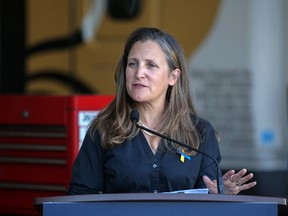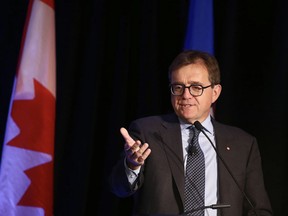'The curse of oil is real, and so is the dependence of many of the world’s democracies on the world’s petro-tyrants'

Article content
Canada will have to fast-track energy and mining projects if it is to help its democratic allies and achieve its own net-zero ambitions, Deputy Prime Minister Chrystia Freeland said in a speech this week in Washington — the most tangible signal to date that the federal Liberal government is prepared to address regulatory hurdles that have hampered economic development in this country for years.
Advertisement 2
Article content
In a swing through the U.S. capital to attend meetings of the IMF and World Bank, Freeland told a gathering at the Brookings Institution that a deepening of trade ties between allied democracies will be necessary to combat powerful autocratic regimes such as Russia and China. Democracies, Freeland said, must make a conscious effort to build supply chains through each other’s economies — a phenomenon U.S. Treasury Secretary Janet Yellen has described as “friendshoring.”
Article content
Freeland went on to say the Canadian government must be prepared to expend some “domestic political capital” in the name of economic security for its democratic partners — as Europe did during the COVID pandemic when European vaccine makers honoured their contracts with non-European allies.
Advertisement 3
Article content
“Canada must — and will — show similar generosity in fast-tracking, for example, the energy and mining projects our allies need to heat their homes and to manufacture electric vehicles,” Freeland said. “I cite these examples because, critically, friendshoring must be green. The curse of oil is real, and so is the dependence of many of the world’s democracies on the world’s petro-tyrants.”
Freeland’s pronouncement set off a shockwave in Canada, surprising some trade experts and drawing praise from energy and mining groups who have been pushing for more regulatory certainty to encourage investment in Canada’s natural resource sector.
History is shifting
Carlo Dade
“This could be really important,” said Carlo Dade, director of the trade and investment centre at the Canada West Foundation, noting that it would amount to a “sea change” if the shift is sustained and serious.
Advertisement 4
Article content
“This certainly seems to be an astute response to the moment — a realization that the moment has shifted, history is shifting,” Dade said. “The question is, though, will it be long term?”
Critics of the Canada’s current regulatory process have argued it has hampered investment in oil and gas, renewables, hydrogen, mining and emissions-reduction projects, stalling growth in production and preventing Canadian resources from reaching global markets. While improvements have been made to strengthen consultations with Indigenous people under the federal Impact Assessment Act — the changes have not yet translated to more regulatory certainty for investors.
“How many boards of directors are going to approve their CEO to go and spend billions of dollars on a project and a process and an application that is highly uncertain at the end of that?” said Adam Legge, president of the Business Council of Alberta, at a recent Alberta Securities Commission conference. “At the very end of it, after all the due diligence is done and checks have been done and studies have been done, it’s still a highly uncertain politicized decision.”
Advertisement 5
Article content
It’s not yet clear what steps the federal government is prepared to take to improve the process, though Freeland’s remarks have some precedent.

Natural Resources Minister Jonathan Wilkinson has said that the federal government hopes to align regulatory and permitting processes to “speed up” the rate at which projects are built through so-called Regional Energy and Resource Tables. The tables would bring together federal, provincial and Indigenous partners to identify and accelerate resource projects — though, critically, just British Columbia, Newfoundland and Labrador and Manitoba have agreed to the process so far.
“It is certainly my hope that Alberta will be part of this process as soon as possible,” Wilkinson told a recent gathering of business leaders at the Calgary Chamber of Commerce.
Advertisement 6
Article content
Still, Canadian industry groups have welcomed the deputy prime minister’s recent comments, urging the government to use the tools at its disposal to move critical minerals and energy projects forward more quickly.
“There are definitely ways to improve the timeliness and efficiency of federal project reviews and we’re keen to see the government use the tools they have more effectively,” said Pierre Gratton, president of the Mining Association of Canada, citing the Ring of Fire project in northern Ontario, as well as nickel projects near Sudbury and copper projects in B.C. such as the joint Teck Resources-Newmont Corporation Galore Creek Mine as examples.
It is certainly my hope that Alberta will be part of this process as soon as possible
Jonathan Wilkinson
However, the recent visit to Canada by German Chancellor Olaf Scholz and his departure from the country without an agreement on liquified natural gas (LNG) has exacerbated pessimism in the resource sector that the Liberal government will ultimately be willing to facilitate further fossil fuel production.
Advertisement 7
Article content
Freeland appeared to open the door to additional investment in LNG on Friday, calling it “an important transition fuel” that could keep the world from burning coal amid the current energy crunch.
“We will always be looking at economically viable LNG projects,” Freeland told reporters as the IMF meeting concluded on Friday.
Freeland also addressed calls for the federal government to create incentives to decarbonize on par with those in the U.S. Inflation Reduction Act — legislation that could prompt a surge in investment in emissions reduction and renewables south of the border over the next decade.
Advertisement 8
Article content
“It is something we are very, very focused on,” Freeland said Friday. “We need to act even more energetically and aggressively than we have hitherto…. We need to find ways to attract even more private capital.”
Those comments came after Canada’s largest oilsands companies announced earlier in the day that their ambitious plan to cut emissions by 22 million tonnes by 2030 will require a $24-billion investment in carbon capture and storage and other emission-reducing technologies — a sum that proponents say will require assurances from governments on the long-term price of carbon.
Canada’s ability to deploy renewables and low-emission fuels and technologies also face the prospect of being bogged down in the same regulatory processes that are hampering conventional energy production.
“It’s just too slow,” Legge said. “We have countries that we’re competing with in some of these more transition-oriented fuels like hydrogen, like rare earth minerals, in countries like Australia, who are doing a far better job, far faster job of approving these projects that are going to be essential to enabling these countries to compete in the low-to-zero emitting future.
“We’re going to miss that boat if we don’t begin to think more competitively, more nimbly.”
With additional reporting by Marisa Coulton, Naim Karim and Reuters.
• Email: mpotkins@postmedia.com | Twitter:
Advertisement
Canada will fast-track energy and mining projects important to allies: Freeland - Financial Post
Read More



No comments:
Post a Comment